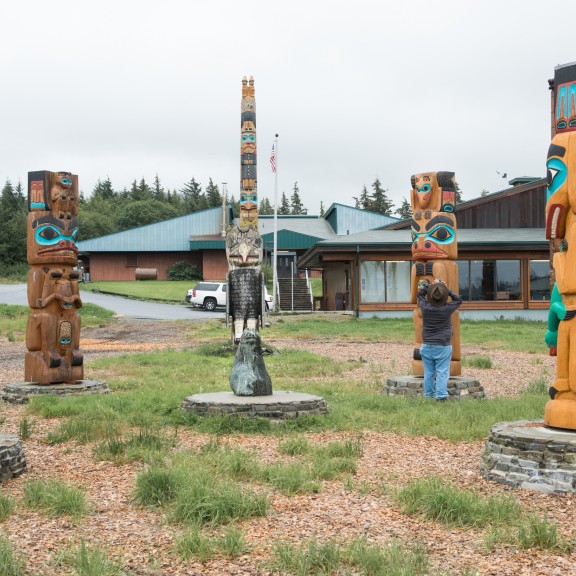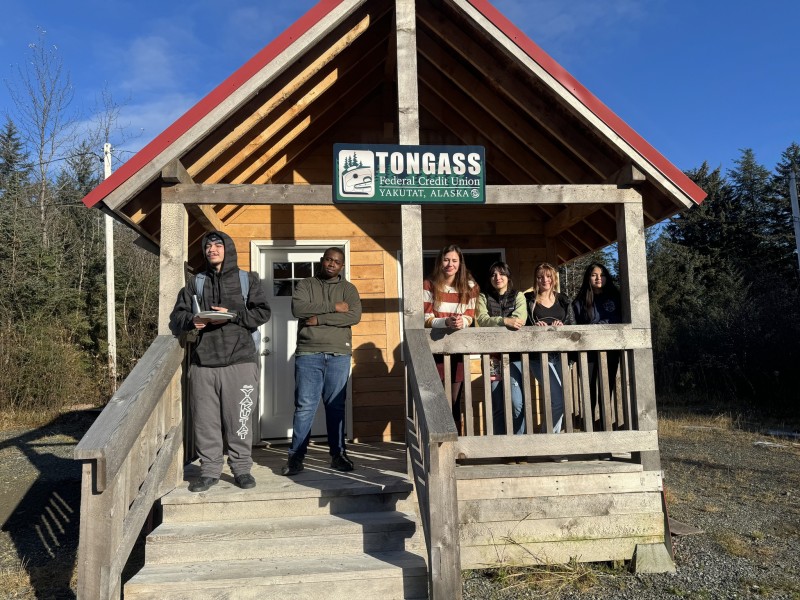Our Stories
Inclusiv members serve residents of low-income urban, rural and reservation-based communities across the US. We are proud to help them close wealth gaps and create thriving communities. Below we highlight the support we provide and spotlight some of the countless stories about the incredible work our credit unions do to remove barriers to financial opportunities.
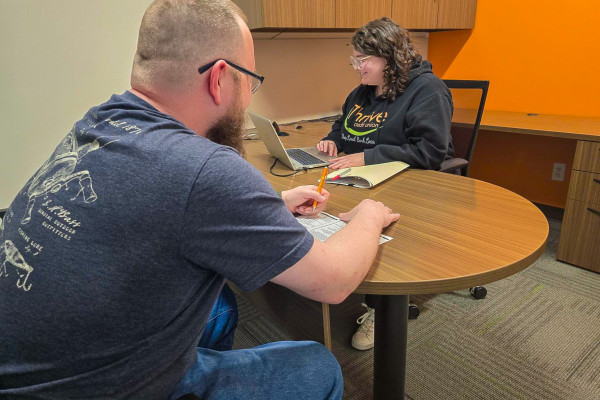
Thrive CU Rewrites Financial Futures in Indiana
Thrive Credit Union was founded by the hardworking employees of Delco Battery in 1940, united by a shared vision of financial empowerment and cooperative support.
Explore Our Collective Impact
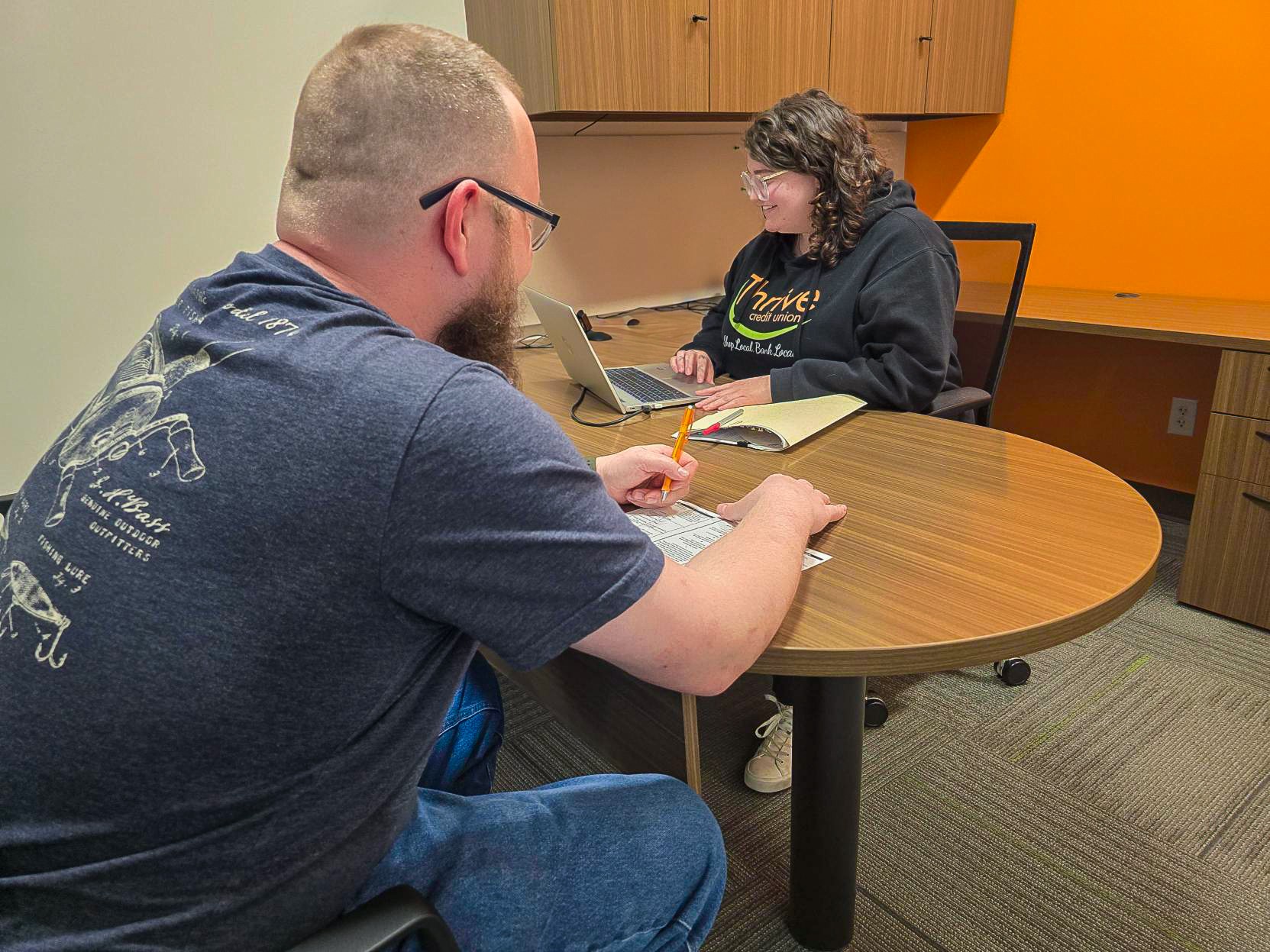
Thrive Credit Union was founded by the hardworking employees of Delco Battery in 1940, united by a shared vision of financial empowerment and cooperative support. Over eight decades later, the credit union has expanded to serve individuals and families in Delaware, Madison, and Henry Counties in Indiana and continues to deliver on their steadfast commitment to helping every member thrive.
Financial wellness in Delaware County can be undermined by a prevalence of high-cost, fringe lenders that trap people in debt as they try to make ends meet. However, Thrive helps people find a path forward. A couple recently came to them with seemingly impossible debt challenges from multiple high-cost lenders. Over the years, they had both taken out loans to invest in their undergraduate and graduate education, as well as their home. Although they had made it to a place in life where they both had successful, stable incomes, sky-high interest rates prevented them from making meaningful progress on paying off their debt or saving for their future. When Thrive stepped in, they were able to get the couple $50,000 in debt consolidation to lighten their load. Now, they have a strong financial outlook, and as nonprofit social workers in their community, their dream is to pay it forward by building more affordable housing for Delaware County after their debt is cleared.
Thrive Credit Union’s relationship to their community demonstrates the transformative impact of the CDFI and credit union model. When financial institutions are rooted in fair access and real trust, everyone benefits.
Sixth Avenue Baptist FCU is a CDFI credit union chartered in 1963 to help meet the financial needs of the members of Sixth Avenue Baptist Church and their families.
In this video, Ms. Carolyn Reese tells the story of how Sixth Avenue Baptist FCU stepped in to offer support after hearing about her hardships. When her house caught fire, Ms. Reese and her two daughters and grandson were displaced for a year, living in a one-bedroom rental. Just when they were ready to move back in, the house caught fire a second time, and the insurance company had cancelled her policy after paying for the repairs from the first fire.
However, this time, a neighbor connected her with Michele from Sixth Avenue Baptist FCU, who was able to help Ms. Reese and her family get back on their feet and into their home with an affordable real estate loan.
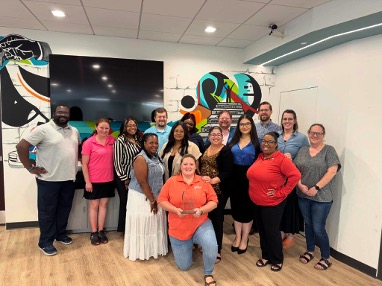
People’s Advantage Federal Credit Union is a financial cooperative committed to helping everyday people get ahead. Based in Petersburg, VA, they were recognized as the 2024 Credit Union of the Year by the League of Credit Unions & Affiliates for their deep commitment to breaking down financial barriers and helping members achieve their financial dreams.
People’s Advantage FCU has a philosophy of helping people through any situation that may occur during their lives. They recognize that everyone has a story, and bad things happen to good people. Through financial counseling and tailored financial services, they help members dramatically improve their credit scores and find personalized solutions. As a certified CDFI since 2018, People’s Advantage embodies the CDFI mission of community impact.
For many members, People’s Advantage has been there when it mattered most. For example, a longstanding member who successfully ran a caulking business for several years faced a major challenge when a high volume of outstanding accounts receivable left them stretched thin for cash. In this stressful situation, they knew they could turn to People’s Advantage for support. The credit union was able to provide them with a $40,000 business line of credit to help stabilize their cash flow, which enabled them to continue serving their clients while they worked to recover the outstanding payments. Now the business is operating on a stronger financial footing, with their cash flow stability restored.
Another business owner who ran a trucking company approached People’s Advantage seeking to purchase a truck that they had previously been leasing. People’s Advantage worked with the business owner to help them purchase the truck through affordable financing, saving them an incredible $2,430 per month. This strategic move helped the company both reduce expenses and strengthen their asset portfolio, positioning them for sustainable growth and prosperity in the long term.
Stories like this show what makes People’s Advantage Federal Credit Union special. With people at the heart of their mission, this CDFI credit union stands by their members through life’s highs and lows, empowering small businesses to grow and thrive in the process.
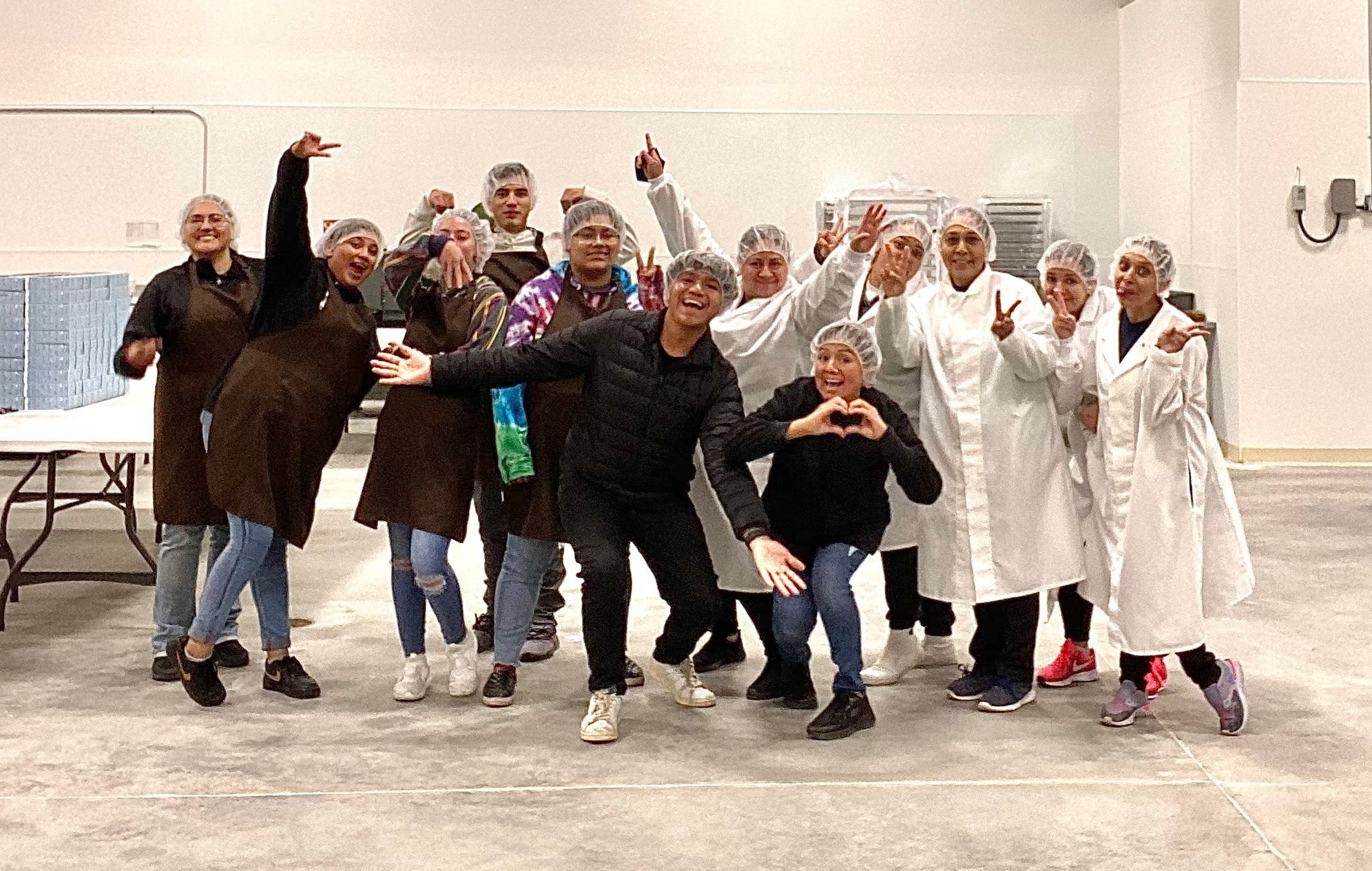
Connections Credit Union’s roots run deep within the communities they serve. They got their start in 1937 as a credit union for telephone company employees and their families in Pocatello and Boise, but today, Connections serves more than 20,000 members across southern Idaho through ten branches and one mobile branch.
The credit union's mobile branch is a fully equipped financial hub on wheels, designed to bring trusted financial services directly to rural and remote communities across Idaho. To Connections, this effort to meet people where they are is a central part of their mission as a CDFI. Though Connections received their CDFI designation in 2022, they have always been a CDFI at heart, striving to find new ways to support and uplift Idaho communities, especially those with limited access to financial resources. At the ribbon cutting for the mobile unit, Connections CEO Jamie Simmons told the Idaho State Journal, “There are a lot of rural and underserved communities around our area. We're so excited to be able to continue and make financial services accessible and reliable to those that need it most.”
Empowering one ambitious person with the right financial tools can generate ripple effects that benefit an entire community. Connections member Eric Torres-Garcia is a Boise State Graduate and young entrepreneur who unexpectedly went viral overnight for a novel hot chocolate invention he shared on TikTok in December 2019. From there, Cocoa Bombs LLC was born, selling fun spheres of hot chocolate mix filled with edible surprises. In its first day, Cocoa Bombs sold out with $6,000 worth of orders, but Eric’s limited financial means and entrepreneurship experience left him scrambling to fulfill orders and grow his new business. When his family discovered Connections Credit Union, the credit union was able to assist Eric in his business growth journey and provide critical financial support. By 2021, Cocoa Bombs was pulling in over $100,000 in annual revenue. And that same year, Eric published the first ever Cocoa Bombs cookbook and launched a 7,000 square foot production facility in Blackfoot, Idaho, bringing jobs and community pride to his hometown.
Connection’s Credit Union’s CDFI mission says, “When a CDFI steps in, dreams take flight, and communities thrive.” Eric’s journey is a powerful reminder that when local business owners are given the tools to succeed, their success ripples far beyond themselves.
In 1936, a group of General Electric (GE) employees based in Fort Wayne, Indiana joined together to start a credit union at their GE plant to serve GE employees and their families. Today, that credit union has grown into MidWest America Federal Credit Union, which operates 15 full-service offices across Northeastern Indiana, employing over 190 individuals and serving more than 51,000 members with assets over $940 million. As a credit union, their approach to providing financial services starts with building relationships, and they pride themselves in taking the time to get to know their members. Because of this approach, they know that providing financial services is about more than just access to capital. It’s also about the cozy feeling of a family dinner in your very first home, or the sense of pride you feel after a day of hard, honest work bringing you closer to your financial goals. By equipping members with the tools to save money and make smart investments, MidWest America opens doors to help their members thrive in all areas of life. The opportunity to improve the lives of their neighbors inspires every move they make.
Lending for clean energy and energy efficient home improvements is one such opportunity MidWest America Federal Credit Union has identified to improve their members’ quality of life. While they have already been making loans for these products and services, they would like to grow this segment of lending to reach more low-income areas. They have already taken steps to do so by partnering with the Indiana Energy Independence Fund to start offering Smart-E loans, which are no money down, low-interest loans for energy improvements with flexible terms which could benefit low-to-moderate-income and credit-challenged individuals. Smart-E works through a network of trustworthy, licensed contractors to help people make improvements to their home such as efficient heating and cooling systems, appliances, and home retrofits. Through these home improvements, MidWest America Federal Credit Union is excited to boost local contracting jobs and power an economic engine in the community by driving greater demand for domestic manufacturing of these technologies.

CCIA funds would enable MidWest America FCU to provide loans at even better rates with more flexible term lengths, saving money for homeowners which they can put back in the local economy. With CCIA funding to use for loan loss reserves, they could expand their risk appetite to serve a wider population that may not otherwise have the opportunity to make these home improvements that save money over the long-term. And as a low-income designated credit union under the National Credit Union Administration (NCUA) that made 40% of their loans in low-income communities last year, MidWest America Federal Credit Union is uniquely well-positioned to execute on this vision.
The credit union already has interest from trusted community partners to assist with outreach, including a network of 26 Indiana churches called Ubuntu, a local housing development nonprofit called Brightpoint, and two other Indiana credit unions—Afena Federal Credit Union and Urban Beginnings Choice Federal Credit Union. In addition, they are partnered with Bridge of Grace Compassionate Ministries Center, a faith-based nonprofit that buys and rehabilitates dilapidated housing in Fort Wayne, Indiana, aiming to reduce blight and provide much-needed housing for low-income families in Indiana. MidWest America and Bridge of Grace still hope to help these families cut energy consumption and costs with efficiency and appliance upgrades that are too often out of reach for them. With their expertise in financial education and affordable lending for low-income Hoosiers, MidWest America Federal Credit Union is helping people in their community achieve greater self-sufficiency and make choices that save them money on their monthly energy bills, because no one should have to choose between keeping the heat on in the winter and keeping food on the table.

The City of New Haven and other community leaders join MidWest America FCU in a ribbon cutting ceremony for their New Haven branch.
 |  |
Bridge of Grace community members work to rehabilitate homes in Fort Wayne, IN.
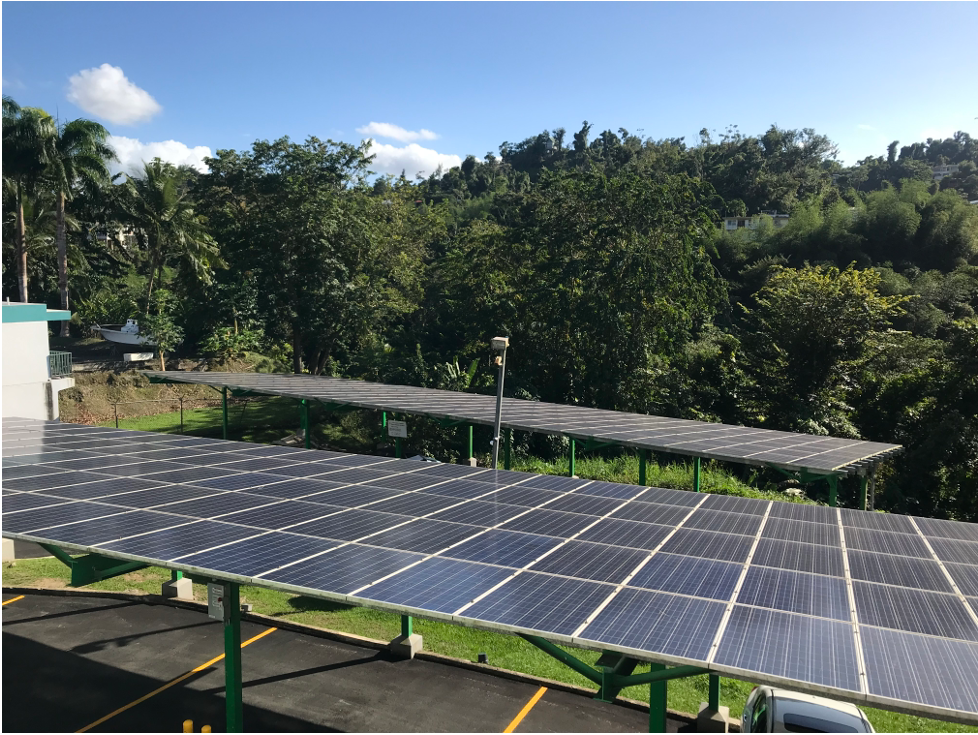
Even before Hurricane María devastated Puerto Rico in 2017, causing $90 billion in damage, frequent climate events motivated Cooperativa Jesús Obrero to build resilient infrastructure that can provide lower utility bills and alternative power to its members. Its President Aurelio Arroyo González describes that the cooperativa is part of the “critical infrastructure” helping the community to function on a day-to-day basis as well as prepare for and recover from natural disasters.
Located in Guaynabo, San Juan’s metro area, Cooperativa Jesús Obrero was an early adapter of solar-generated energy, exploring the possibilities of using solar as an alternative energy source in 2011, running a pilot solar loan program in 2013, and creating solar loan lending guidelines for the Cooperativa in 2014. In 2015, the Cooperativa installed a 96.5 kW solar array at its branch in Guaynabo, PR. There, solar car ports provide shaded parking structures that reduce the branch’s energy costs by 86% annually. In total, the solar system has generated 831 mwH since 2015 and offset 649 tons of CO2 emissions. Spurred further by Hurricane María and the blackouts it created; Cooperativa Jesús Obrero expanded its solar loan program to support commercial solar development. The goal is for solar to be able to provide decentralized and consistent access to electricity if the electrical grid is impacted by a natural disaster.
Since 2011, Cooperativa Jesús Obrero has financed 450 photovoltaic (PV) solar systems in 26 municipalities across the island, and its renewable energy financing makes up 10% of its total loan portfolio. These solar loans have the potential to reduce energy costs for the Cooperativa’s members. For example, a residential PV system installed in Guaynabo and financed by Cooperativa Jesús Obrero in 2016 reduced the customer’s monthly energy bill from $250 to just $3.
As part of expanding their solar loan program, the Cooperativa’s President took the Inclusiv-University of New Hampshire virtual Consumer Solar Lending Professional Training and Certificate Program and earned the Solar Lending Professional Certificate. While in the class, he shared his solar lending expertise with executives from other enrolled financial institutions.
Looking towards the future, at the current rate of sea level rise almost 50% of Puerto Rico’s coastline is projected to disappear within 30 years, impacting 60% of Puerto Rico’s coastal residents. “[The] communities we know will change drastically,” and CDCUs and cooperativas will continue to play a critical role in supporting their communities as they adapt to climate change, Arroyo reflects.

Historically Black Colleges and Universities (HBCUs) were established during the Reconstruction Era to provide higher education to Black Americans at a time when a vast majority of colleges and universities would not admit them. Serving a population overlooked and denied by mainstream financial institutions, many of these institutions ventured beyond education, establishing their own credit unions.
First organized nearly 100 years ago as not-for-profit and owned by the members, some of the oldest credit unions in the entire movement were established on the campuses of Florida A&M University (1935), Howard University (1935) and Virginia State University (1939).
HBCU credit unions helped Black communities to find financial success by providing loans used for furthering education, buying homes and managing debt. They also provided a safety net to build assets and raise families. Many members can tell stories of grandparents or parents receiving their first home or car loan from an HBCU credit union.
Although their benefits cannot be denied, HBCU credit unions are increasingly facing challenges. These credit unions tend to be smaller than other credit unions, with limited resources and face stringent financial and regulatory burdens. They also face social challenges, particularly a lack of widespread awareness of the unique contributions they make to their communities. Without the proper recognition, HBCU credit unions are limited in their ability to garner the necessary support and partnerships. Connectedness between HBCUs and their associated credit unions has also decreased.
Despite their smaller size, HBCU credit unions continue to provide a range of innovative financial services. For example, Florida A&M University FCU founded their SmartSteps Micro Loan Program which works with local governments to provide financial support to women and minority-owned small businesses. Councill FCU, which has historically been connected to Alabama A&M University, has been taking steps to improve financial literacy for all members. Across the country, they are increasingly working to help their members and communities succeed.
HBCU credit unions are also gaining visibility through their work with organizations like Inclusiv and TruStage. Inclusiv’s mission is to supports credit unions in removing barriers to financial opportunities for underserved communities through initiatives, expertise, investments and advocacy for its member credit unions. Inclusiv has consistently advocated for the support of HBCU credit unions, sharing stories that illustrate how these institutions support financial well-being and generational wealth for their communities. TruStage (formerly CUNA Mutual) is an organization that provides reliable insurance, investment and technology solutions to better help members plan for tomorrow. These groups, in conjunction with the African American Credit Union Coalition (AACUC), are helping HBCU credit unions plan for many more decades of service.
Support for HBCU credit unions – pillars of resilience and progress – is not just a financial matter but critical to achieving equity and empowerment. By fostering financial literacy, supporting entrepreneurship, and providing accessible banking services, HBCU credit unions not only enhance economic stability, but they also contribute to the broader goal of social justice. As more of us recognize this historical significance and ongoing impact, it will become clearer to the greater financial landscape that investing in HBCU credit unions is an investment into a future where everyone can thrive. Embracing these institutions is essential for building a more inclusive and prosperous society for generations to come.
There are several small communities in Southeast Alaska that do not have access to financial services. Most of these communities are located on remote islands or not connected to the road system.
Recognizing the need for financial services in these underserved areas, Tongass FCU established a plan to create TFCU microsites. The markets that TFCU seek to serve include small villages and towns within our Southeast Alaska field of membership, with population sizes of 400 to 1,000 year-round residents. TFCU microsites are open three days per week, four hours per day. TFCU also provides an ATM in the community. The sites are operated by one to two employees.
In 2005, TFCU began offering financial services in Thorne Bay, a former logging town located on Prince of Wales Island with 500 residents. At the time, TFCU didn’t realize that Thorne Bay would become a blueprint for future sites. Thorne Bay's community business association asked TFCU to establish the site and provided volunteers to assist.
TFCU's first space was located inside a sporting goods store that was in the lower level of the store owner’s home. The cash was kept in the gun safe, and transactions were noted on paper. Since then, TFCU has created a more sustainable model, hiring employees, using computers, and finding a permanent home in the City of Thorne Bay offices.
The Hydaburg microsite on Prince of Wales Island was opened in September 2019. TFCU partnered with a local school that provided a free office and a space for the ATM. The school in Hydaburg serves all grades and is the largest public building in the village. Hydaburg has never had local financial services or an ATM and is an hour drive from the nearest community with financial services, a TFCU branch in Klawock.
Hydaburg has approximately 400 residents. The new site has been especially beneficial in this community for elders who are unable to drive into Klawock and students learning about using financial services. The local tribe was the first organization to open an account with TFCU to demonstrate their support.
The second microsite was opened in Kake in December 2019. TFCU partnered with the local tribe to provide a free office space on the first floor of the tribal building and provided a space for the ATM in their local mini-mart. Kake is located on Kupreanof Island, 95 air-miles southwest of Juneau, the closest community with financial services. Kake has approximately 630 residents. In the first two weeks of services, TFCU opened 29 accounts. The grand opening was celebrated with locally made fry bread drawings for prizes, and transportation provided by the senior center van. Two Kake elders opened accounts that day.
Plans to open a microsite in the community of Hoonah in early 2020 were delayed due to the pandemic. The Hoonah Indian Association pitched in to complete physical upgrades needed to bring in equipment and teller stations, and, with considerations to travel and health and safety, staff was trained. The Hoonah microsite opened in summer of 2020.
TFCU is working to provide efficient services, using online and mobile banking to keep costs down. Community support and participation makes microsites sustainable. Partnering with the Hydaburg, Kake, and Hoonah communities ensure TFCU's long term sustainability and growth.
